All the Answers
Well-known member
The university march unites the opposition in the same demand and challenges the resistance of the Government - Infobae

Source:

La marcha universitaria une a la oposición en un mismo reclamo y desafía la resistencia del Gobierno
La UBA y las universidades nacionales liderarán una movilización masiva que sumó adhesiones de todo el espectro político y sindical. Reclaman más presupuesto para gastos de funcionamiento y salarios docentes. Los organizadores pidieron evitar símbolos partidarios y llamaron a marchar con...
April 23, 2024
The UBA and the national universities will lead a massive mobilization that attracted support from the entire political and union spectrum. They demand more budget for operating expenses and teacher salaries. The organizers asked to avoid party symbols and called to march with Argentine flags. Milei rejected the protest
By Robertino Sánchez Flecha
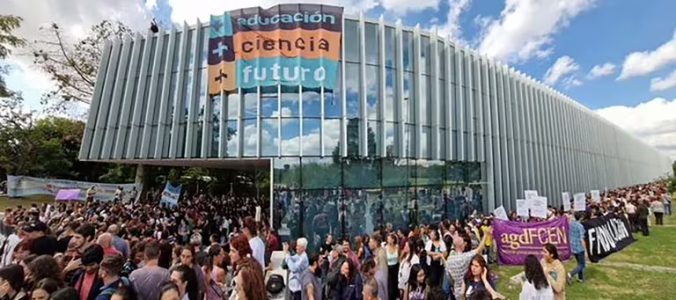
The federal university march will take place this Tuesday, April 23 throughout the country.
The Government of the President of the Nation, Javier Milei , will face this afternoon the most significant and massive mobilization of the four months of administration. The relevance responds to the distinctive characteristic of this march, unlike previous ones that took place during the libertarian mandate: transversality . The demand in defense of public education, the main slogan of the day, which protests the lack of budget for national universities, achieved support from the entire political spectrum , unionism , sectors of civil society, academics, students, artists, young and old. And despite having multiple support from the ideological arc, the march does not appear as “ partisan ” so far.
The transversality of the mobilization bothers the Milei Government. The heart of the libertarian narrative consists of a discursive, agonal strategy with which La Libertad Avanza encompasses the entire opposition, union and business political spectrum with the label of “ caste .” That signifier was cleverly applied during the electoral campaign and allowed the libertarian leader to bring together almost the entire establishment. It was so efficient that it managed to transcend the gap between Kirchnerism and anti-Kirchnerism to produce a new polarization: Milei versus “the caste . ”
But the university claim is led by rectors, teachers, graduates and students who do not necessarily admit that label. The opposition, from Peronism to the Radical Civic Union (UCR), supported the university system, although without overshadowing the protest . The General Confederation of Labor (CGT) and the different aspects of unionism did the same : they adhered to this afternoon's call but left the organization and narrative of the claim in charge of the universities.
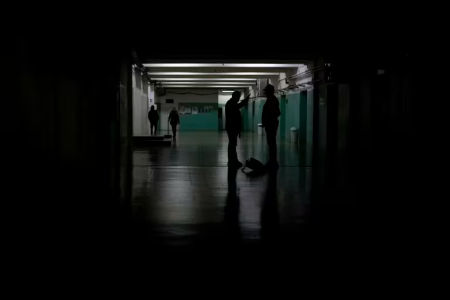
A dark hallway at the University of Buenos Aires, a decision by the university authorities to save electricity after the budget adjustment (AP Photo/Natacha Pisarenko)
Arguments against the march: political mobilization
“The best thing that can happen to us is that Kicillof, Massa and Lousteau appear in the march,” a national government official told Infobae . “That politicians go gives us arguments to reject the march , if not, it is a difficult stop ,” he was honest. The Casa Rosada made announcements with updates to the budget items of the national universities. The last one was last night, as a final attempt to dissuade today's demonstration .During the week, the Secretary of Education of Carlos Torrondell and the Undersecretary of University Policies, headed by Alejandro Álvarez , carried out efforts to dismantle or reduce the Federal University March. The attempts did not work . Or they were late. The mobilization had taken shape and the student and academic movement was already advanced in organizing the protest.
In order to avoid partisanship of the claim, the UBA and the national universities made a special request to the political and union spaces that will mobilize today: that they do not use banners or party signage and carry only Argentine flags . It is an idea that seeks a photo with a crowd dyed blue and white with a unified claim for education and public universities.
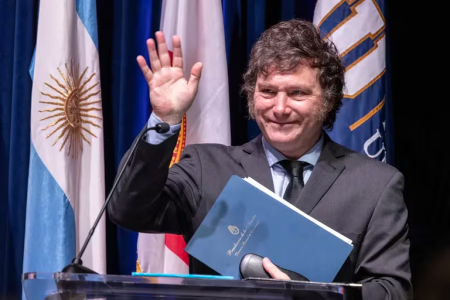
Javier Milei, President of the Nation, maintains a confrontational stance with the university system
This is the transversality that worries the Government. Milei is convinced of the importance of auditing the budgets of each national university. He believes there may have been cases where funds were used in a “non-transparent” manner. Furthermore, he insists on installing the idea that the public university was a breeding ground for “ indoctrination ” by some teachers and student centers.
However, the opposition will take to the streets today to add political volume to a massive mobilization that will be led by the Argentine University Federation (FUA), the Buenos Aires University Federation (FUBA), and the national universities with teachers, students and non-teachers. “We are expecting a lot of people . The demand for the public university transcended the entire society. “It is not a partisan march,” Lucille Daniela Levy , president of the FUBA, told Infobae. “The Government speaks from ignorance to delegitimize the march and the student demand,” said the reference of the university movement and added: “ There is nothing further from indoctrination than the public university .” Today's mobilization will be broad and plural."
The march took on a greater dimension when last week the CGT announced its support for the claim. Then the two CTA and other aspects of unionism folded. The political leaders of the opposition did the same.
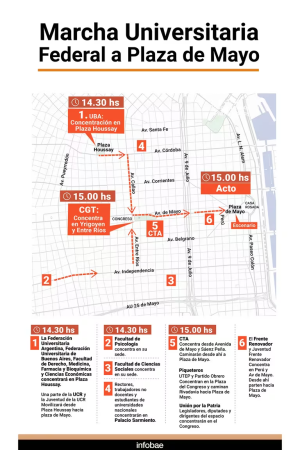
What will the columns of the different spaces that will participate in the Federal University March be like?
The opposition united under the university demand
The UCR , a space of inherent tradition of the university movement and public education, will display this afternoon a column in which national deputies and senators, leaders, militants and co-religionist students linked to radical groups, such as the Purple Strip , will converge . The same attitude will be adopted by the leaders of Elisa Carrió's Civic Coalition , as well as other spaces of what was Together for Change that maintain a distant position from the national Government.The same will happen with Peronism . Kirchnerism will mobilize both front-line leaders and militants linked to university militancy. For his part, Axel Kicillof , Buenos Aires governor, announced yesterday that he will join the march along with part of his cabinet team and harangued: “We are going to fill the square .” While Frente Renovador will do the same. Sergio Massa , leader of that force, asked through his company's WhatsApp groups to mobilize today.
The Left Front will do the same , which usually participates in mobilizations and events related to public education. Through its different currents, Trotskyism, with a strong presence in university militancy, will reach Plaza de Mayo with its own column. Those who will also be present will be picketing spaces such as the Polo Obrero , led by Eduardo Belliboni , and the groups gathered at the UTEP.
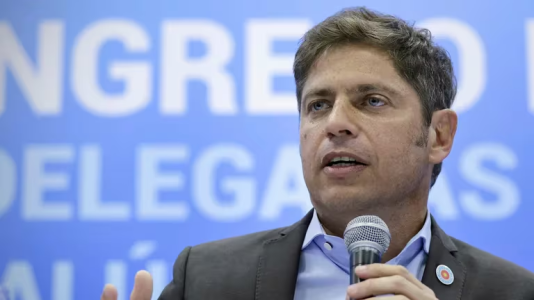
Axel Kicillof, governor of Buenos Aires, called to mobilize for the march of the national universities
The heart of the claim: funds for national universities
It should be remembered that the conflict was unleashed by the claim led by the UBA due to the lack of budget that affects the operation of the largest university in the country and the rest of the national universities.The Government announced on Thursday a “proposal agreed upon with the National Interuniversity Council ” regarding the budgetary situation of public universities. The decision of the Ministry of Human Capital, headed by Sandra Pettovello , who has the Secretary of Education of Carlos Torrondell under her orbit , ordered an increase of 70% in March, bringing the allocation for operating expenses to $10,075,851,995 per month for the National Universities.
While it announced another 70% in May, reaching $14,224,732,213 per month, totaling a 140% increase over the base allocation of $5,926,971,777 per month. In addition, the measure allocated an extraordinary amount for the needs of university hospitals for a sum of $14,403,479,661 . The UBA came out to deny the agreement and indicated that the measure was “ insufficient .”
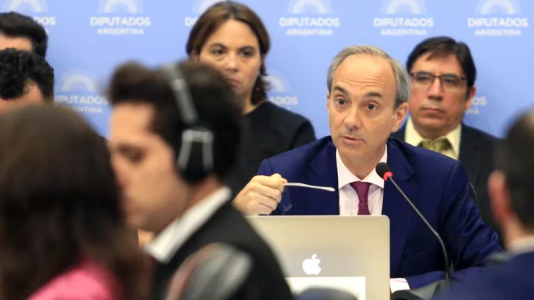
Carlos Torrondell, Secretary of Education of the Nation (NA: MARCELO CAPECE)
The Casa Rosada also anticipated that it will advance a joint audit program of national universities to improve the current system. And he called a meeting for April 30. Sources from the Ministry of Education informed this media that it will be done in the Undersecretary of University Policies, headed by Alejandro Álvarez , in the Sarmiento Palace. Representatives of the Executive Committee of the National University Council will participate. As Infobae learned , the purpose of this summit is to discuss “the changes that society demands, at the same time that we commit to achieving quality university education.”
“The Budget has to be updated because it cannot function with this budget,” said Emiliano Yacobitti , vice-rector of the UBA, in dialogue with Infobae , and added: “Now they intend to update operating expenses by 105%. But there are no joint agreements, there are unilateral agreements . “University professors lost 36% of purchasing power in the last 4 months.”
The President maintains a confrontational stance with the university system and rejects the mobilization of the UBA. They are discussions that are framed within the “cultural battle” carried out by the Casa Rosada.

El video institucional de la UBA convocando a la marcha del 23 de abril
El video institucional de la UBA convocando a la marcha del 23 de abril
cdn.jwplayer.com
The institutional video of the UBA calling for the march on April 23
With heterogeneous support, national universities seek to apply pressure on the Government and twist the arm of the Head of State. This is, perhaps, another battle front that Milei faces that brings together multiple sectors of the political and ideological spectrum.
Transversality appears to be the most challenging aspect of today's march for Milei. And she responds that the UBA and public universities are spaces in which knowledge is built that transforms the biography of citizens of multiple origins. Both ideologically and culturally.
Throughout its history, Argentina has won more Nobel Prizes than soccer World Cups . There were five scientific awards and for “notable contributions” that the country achieved. From Carlos Saavedra Lamas in 1936 to César Milstein in 1984, all the Argentine Nobel Prize winners were natives of the public university. Especially from the University of Buenos Aires (UBA), with which the five winners of the Swedish medal were related as graduates, teachers or even rectors.

